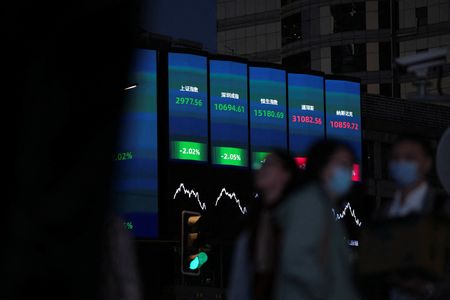 1
1 1
1

By Ankur Banerjee
SINGAPORE (Reuters) – Asian shares were subdued on Wednesday and the dollar hovered around a five-week peak as investors remained risk averse, with the U.S. debt ceiling talks and a mixed set of economic data weighing on sentiment.
MSCI’s broadest index of Asia-Pacific shares outside Japan was 0.20% lower, while Australia’s S&P/ASX 200 index was down 0.56%. The Shanghai Composite Index and Hong Kong’s Hang Seng Index eased 0.4%, dragged by China data showing a wobbly post-COVID recovery.
Japan’s Nikkei, however, spiked 0.68% higher, scaling above 30,000 for the first time since September, 2021.
Democratic President Joe Biden and top congressional Republican Kevin McCarthy edged closer to a deal to avoid a looming U.S. debt default Tuesday.
After an hour of talks, McCarthy, the speaker of the House of Representatives, told reporters the two sides remained far apart on an agreement to lift the debt ceiling.
But he said, “It is possible to get a deal by the end of the week. It’s not that difficult to get to an agreement.”
Without an agreement, in about two weeks, the government might not be able to pay its bills, with economists fearing the country will likely slide into a recession.
As the deadline approaches, “one thing investors can be certain of is that more uncertainty lies ahead”, said Saira Malik, chief investment officer at Nuveen. Malik expects further volatility across equity and fixed income markets until there is greater clarity on the outcome of the negotiations.
“The most likely scenario is a resolution, perhaps at the eleventh hour, enabling the federal government to meet its obligations.”
U.S. stock indexes closed down overnight, hamstrung by dour forecast from Home Depot and April U.S. retail sales data that underscored softer consumer spending. [.N]
The main macro focus is on the U.S. retail sales figures, ING economists said. “These actually came in on the lower end of expectations though the news was mixed, with a lower headline but higher core sales figures muddying the message.”
Recent economic data indicates slowing in the U.S. economy following a string of rate hikes by the Federal Reserve to fight high inflation. Markets are pricing the Fed to cut rates towards the end of the year, according to CME FedWatch tool, but some Fed officials have stuck to a hawkish rhetoric.
Atlanta Fed president Raphael Bostic said that the Fed will need to stay “super strong” in fighting inflation even if the unemployment rate starts to rise later in the year, while Chicago Federal Reserve President Austan Goolsbee said it was premature to be discussing interest rate cuts.
Meanwhile, the dollar index, which measures the U.S. currency against six rivals, rose 0.01% to 102.61, inching closer to the five-week high of 102.75 it touched on Monday.
The Japanese yen weakened 0.05% to 136.47 per dollar, while Sterling was last trading at $1.248, down 0.04% on the day.
U.S. crude fell 0.31% to $70.64 per barrel and Brent was at $74.69, down 0.29% on the day, as a surprise rise in U.S. crude inventories stoked demand concerns on the heels of weaker-than-expected economic data from the U.S. and China, the world’s two biggest oil consumers. [O/R]
Gold prices held steady after retreating from the key $2,000-an-ounce mark in the previous session. Spot gold was last at $1,991.49 an ounce [GOL/]
(Reporting by Ankur Banerjee; Editing by Himani Sarkar)